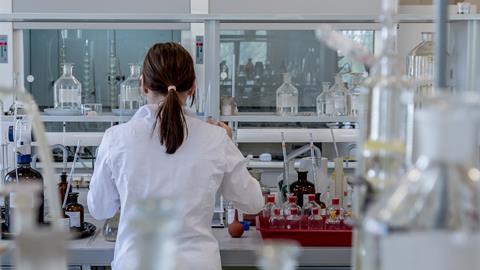The environmental impact of lab research is considerable. Researchers at the University of Groningen mapped the footprint of their labs. In RSC Sustainability they present the results of their efforts to make labs more sustainable and provide tips for other researchers.
Researchers who really aim to contribute to a more sustainable world should first take a close look at the emissions and waste produced by their own lab, Thomas Freese and colleagues from the University of Groningen write in RSC Sustainability. Even though researchers come up with all kinds of worthwhile ‘green’ solutions, they are also part of the bigger problem.
Whereas an average citizen in The Netherlands was responsible for emitting around 13 tonnes of CO2 in 2020, the work of an average researcher alone is responsible for 10 - 37 tonnes of CO2 emissions a year. This includes activities such as travel to international conferences and it is varies across scientific fields. For example, for astronomers emissions amount to 18 - 37 tonnes; for chemists 5 - 10 tonnes and for researchers in life sciences 4 to 15 tonnes of CO2 per year.
More than a household
The inventory by the Groningen researchers shows that electricity and natural gas are primarily responsible for lab-related CO2 emissions. Lab equipment guzzles energy: for example, one fume hood and one -80 °C freezer consume 3.5 and 2.7 times more energy per day than an average household. But water is also a big factor, as labs acccount for 60% of the overall water consumption of the university. And finally, there are the large volumes of plastic material and chemicals that are produced, used and eventually need to be processed.
Clearly, there are many opportunities for reducing the environmental impact. But this can also be daunting, according to the authors. With so many sources of emissions and pollution, it can be hard to decide where to start, or to predict where your efforts would really create an effect. Furthermore, we are all creatures of habit, and not everyone is open to suggestions to change their routines.
Even so, Freese and colleagues prove that small steps can lead to big improvements. Through Green Labs RUG, they have collected a wealth of information on the consumption of wet and dry labs in recent years. Their approach includes using LEAF, a software system that calculates lab emissions and shows where improvements can be realized. But the researchers also performed a variety of measurements and collected waste to get a detailed picture of emissions at the chemistry department. Their results showed that, on average, a chemist produces about 9 tonnes of CO2 a year, and 157 kilograms of hazardous waste.
Simple measures
With simple measures such as closing fume hoods, sharing chemical supplies and developing standard operating procedures, many labs have already managed to bring reduce their emissions and waste streams. Meanwhile, they are also working on larger projects such as using gloves made of recycled materials, washing pipette tips and reusing solvents. Another approach is to create new ways to organize research projects, for example by preventing waste right from the start or re-evaluating chemical reactions that might have been acceptable 20 years ago, but that could perhaps be performed in a more sustainable way.
Since the launch of the projects in 2020, the initiatives in Groningen have already resulted in a total reduction of CO2 emissions of 477 tonnes and annual cost savings of more than €400,000. And that is not the end. Although the team was not able to implement all they envisioned, they hope their overview will inspire other labs to take steps as well and, above all, not to be afraid to start. Freese and co-workers acknowledge that broad support from senior researchers and management will benefit such efforts, but they also stress that it is sensible to just start small. This way, you can easily implement the first measures and explore the possibilities before expanding the network.
This network is already in place, as the Green Labs now also have a Dutch and an international organisation dedicated to enhancing the sustainability of labs and all associated processes. The more labs join the network, the better, because as the researchers state in their paper: ‘We hope that we can initiate systemic change, so that we as researchers can set an example for the rest of society.’













Nog geen opmerkingen